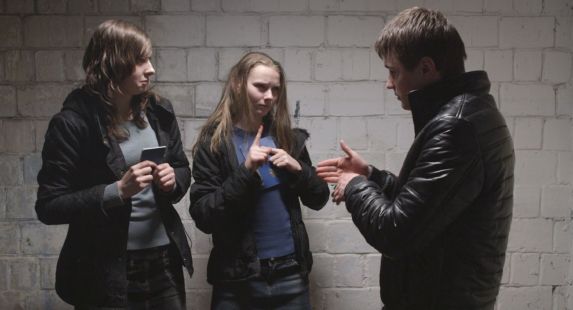The Tribe takes no prisoners. Myroslav Slaboshpytskiy’s latest film, set at a boarding school for deaf students, is told with no spoken dialogue, only in sign-language. Specifically Ukrainian sign-language, and just to make sure you’re fully excluded from this tribe from the get-go, there are no subtitles at any point.
The plot finds the new boy in school (Grigoriy Fesenko) swept up into a gang of hoodlums who, perhaps because of their language barrier, have developed their own morality code, a thuggish, brutal, apathetic way of life. Soon our protagonist shows himself to be as tough as the gang needs him to be, and he is put in charge of pimping his female classmates to truckers. Similarly indoctrinated into the tribe’s isolationist, self-righteous ethic, these teen prostitutes seem to delight in the rebellion that these sexual acts provide, and the easy cash that comes with them. When Fesenko’s protagonist falls for one of the girls, played by Yana Novikova, the young romance swiftly becomes dark obsession, and conflict within the group grows.
It’s ambitious storytelling, a new form of silent cinema. But does it work? Well, overall, yes. The gentle soundscape makes the viewer acutely aware of every sound, both innocuous and threatening, so that when violence erupts in the final act, and oh, does it erupt, it’s all the more deafening. Hyperventilated groans of pain become the closest the soundtrack has to musical accompaniment.
In addition to this, the listening viewer also becomes quickly aware of just how much the deaf students are missing. Out drinking stolen alcohol, they are denied the simple pleasure the joy of a popping champagne cork, or the calming liquid crumble-crunch of snow underfoot. In one of the earliest of the film’s several shocks, sounds only audible to us prophesy danger, which creeps forward relentlessly and unacknowledged.
The early scenes of the film in which our protagonist adjust to his new home almost serve as a parody of high school-set films – we understand everything without language because we have been to school ourselves, seen high school movies. There is a synaesthesiac reaction you get from seeing the constant gestures and hand movement that makes you somehow hear dialogue that is not there. It makes all the clever, timely teen wordplay in films like The Breakfast Club, Clueless, or Mean Girls seem oddly unimportant.
But the savage violence that dominates the latter half of the film has less to communicate, and it is here that the film slips. The unrelenting belligerence hits levels of gore worthy of Martin McDonagh, but without the cheeky dark humour. At the screening I attended, the film’s most gruesome, head-in-hands-burying scene, caused one audience member to faint (he came around shortly after), and several more to walk out.
From the outset The Tribe seeks to exclude you, to show you a world you can never be a part of. The first of its exhausting, unflinching long takes, shows a school assembly that we not only cannot hear, but also, separated from it by a glass panel, we are literally cut off from.
Bleak and disturbing, there is some extremely talented filmmaking at work here, but Slaboshpytskiy’s determination to shock and horrify is the film’s undoing in the end. It’s a joyless movie, but an original one, with a good deal to say about language, inclusion, and the follies of youth. It has to be seen to be believed, but should be avoided if you haven’t the stomach, or heart, for it.
4/5

